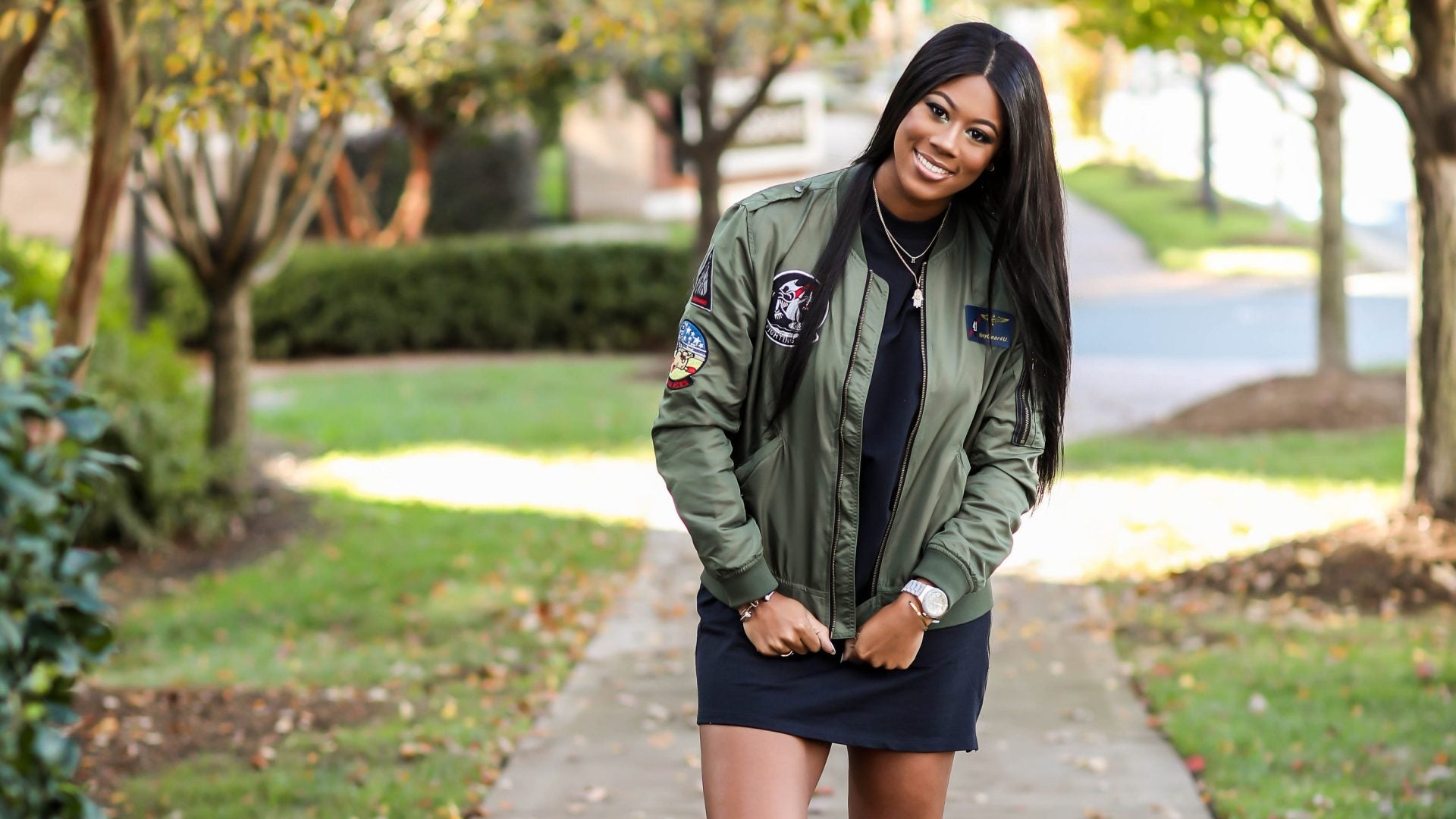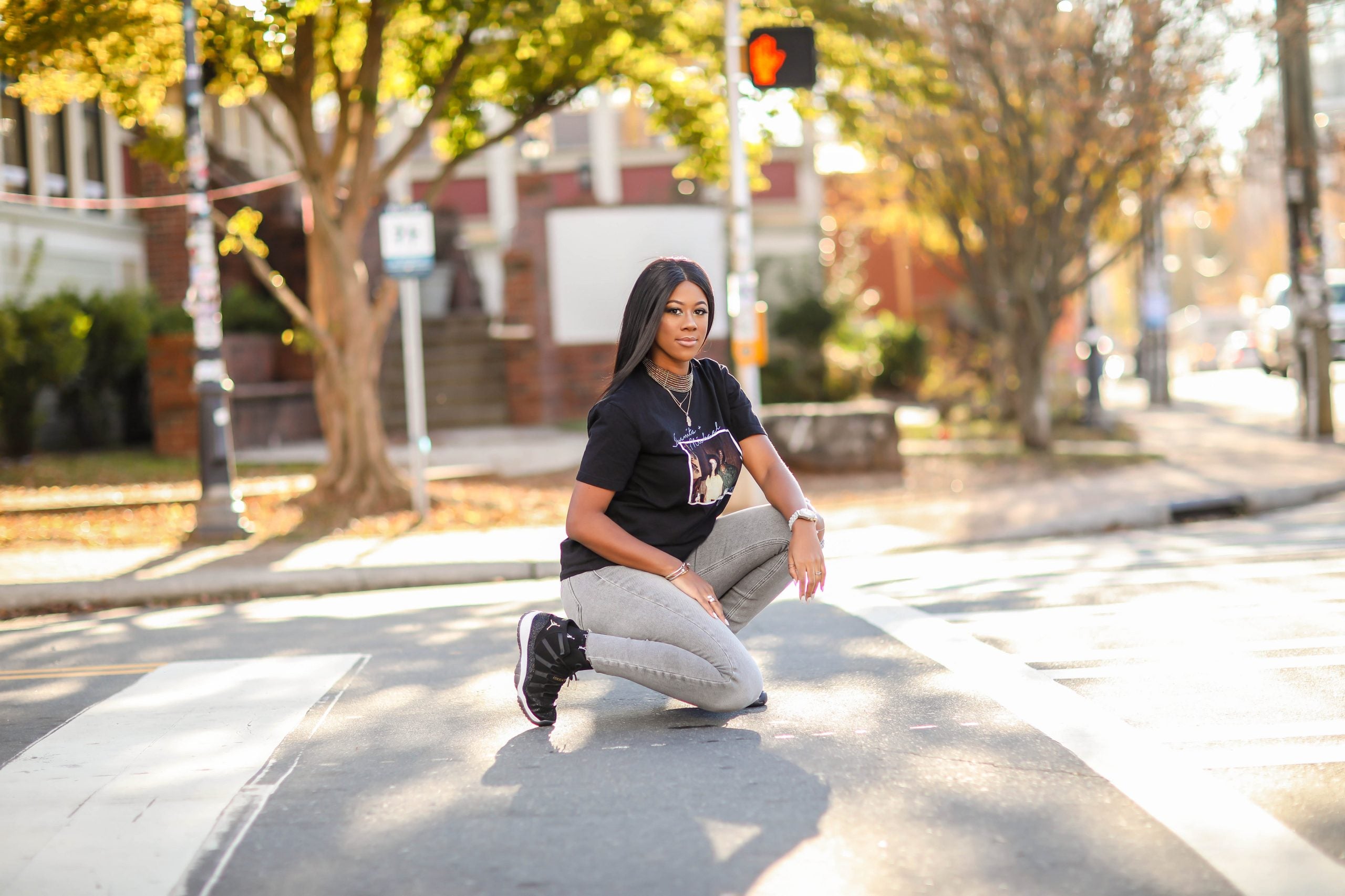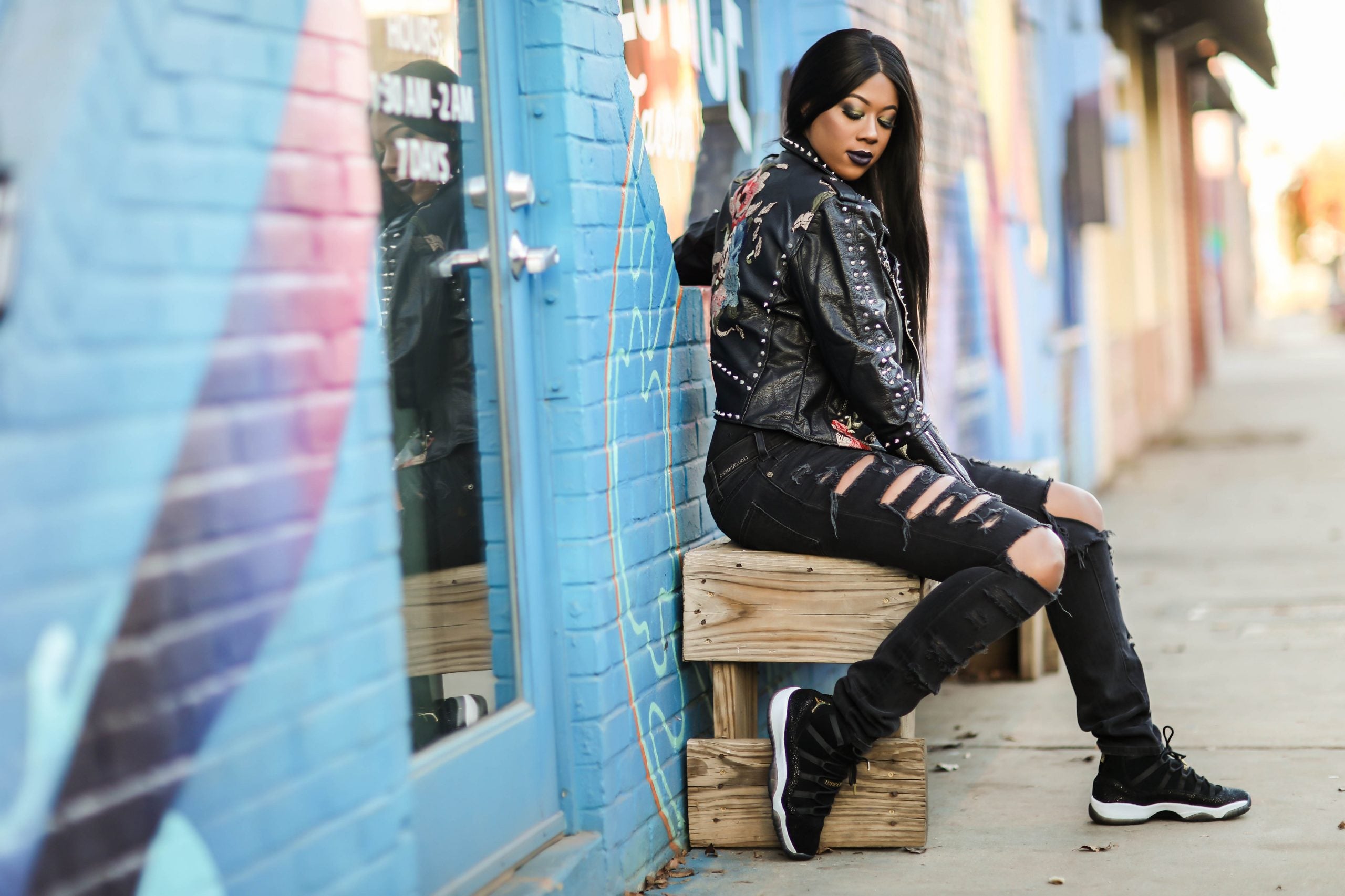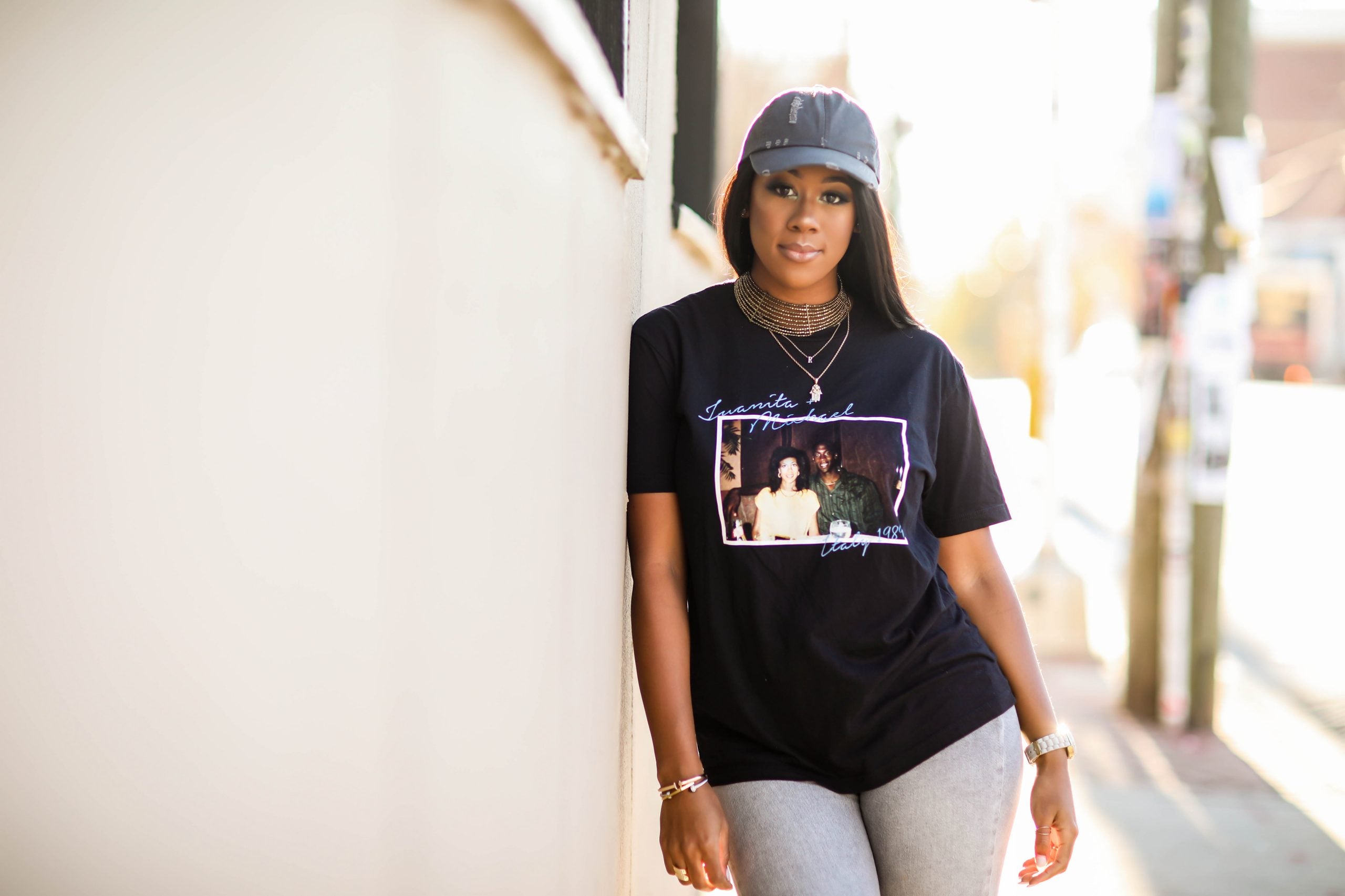
‘Sole Searching’ is a series that highlights Black women in the sneaker community, how their passion for footwear began, their thoughts on Black women in sneaker culture, and how they’re leaving their legacy in the sneaker world.
Everybody has a go-to sneaker that they can’t live without. Maybe it’s the adidas Stan Smith’s or perhaps it’s a pair of PUMA Suede Classics – no matter what, everyone has a certain sneaker that encapsulates their personality and personal style. For Jasmine Jordan, it’s the Jordan Ones. “You can’t not have AJ 1’s. I feel like I could sleep in my Ones,” she laughed. “They could be house shoes, out shoes, whatever I want to be and I love them for that.” Between her Air Jordan Ones and a pair of Jordan x Billie Eilish Air Jordan 15s from the brand’s collaboration with the “Bad Guy” singer, Jordan always keeps a fresh pair handy when she’s on the move.
As the daughter of legend Michael Jordan, Jasmine isn’t new to the sneaker game but that doesn’t mean that she’s taken the power of her platform lightly. While serving as a field rep in the Jordan Brand’s sports marketing division, Jasmine makes it a point to unapologetically shine a well-deserved light on Black female athletes in the WNBA. Jasmine’s primary goal for the Jordan Brand is to not only promote inclusion, diversity, and equity but to practice it and show Generation Z why the Jordan Brand’s legacy has skin in the game far beyond sneakers.
In the premiere installment of ‘Sole Searching,’ Jasmine Jordan speaks to ESSENCE about the sneaker culture in her Chicago hometown, the importance of making space for WNBA players at the Jordan brand, and how she wants to keep her father’s legacy alive through the younger generations.

On her first sneaker memory:
“It had to be like five, six years old when I got my first pair of Sketchers, which is so bad to say now. Back then having shoes that just lit up, I was the coolest kid on the block; you couldn’t tell me anything. I definitely started to realize back then how unique shoes were, then it obviously developed from there once I actually realized we create our own sneakers in a sense, whether that be Nike, Jordans, et cetera. My collection really started to go from there, but having those light-up sneakers definitely made me feel I was a part of a culture that was just one of its kind. It’s exciting to see how it’s evolved since then.”
On Chicago’s sneaker culture:
“I’m from Chicago, but I was really raised in the suburbs of Highland Park, Illinois. Essentially where me and my brothers were, there weren’t a lot of Black families; it was predominantly white. For us, sneakers and our style really were our comfort zone, outside of playing sports and just being athletic or in a lot of activities. Clothes, apparel, and understanding how we wanted to be perceived as young Black kids was definitely something that, back then, we probably didn’t realize how important it was. Looking back, I definitely know that now. Having my own sense of style and allowing it to evolve and grow as I got older was definitely important because I think it allowed me to understand who I am and who I was back then, just in another light. It’s an extension of my personality and it’s constantly growing and evolving.”
On the role of Black women in sneaker culture:
“I feel like sneaker culture is such a male-dominated industry, as I feel like everything is in this world. Nonetheless, unless you see Black women doing it their own way, nothing really catches on the wave. Of course, you love sneakers, you love to see it, et cetera, but the way that we dress, the way we wear sneakers, is one of its kind and iconic. We’re always the ones to set trends or really make a trend be confirmed. You don’t always see us feeling like we have to follow what is happening around us, but instead, we’ll take bits and pieces of sneaker culture or fashion and really turn it into our own. Then we just elevate it. We just always know how to make something that’s existing even better.
“With sneaker culture, that’s the same thing, where we’re understanding, ‘Listen, we don’t always have to wear pink shoes to be within the culture.’ We can rock OGs, we can rock 11s. We could put rhinestones on them. We can elevate them in so many different ways, but unless it’s on a Black woman, I feel like it’s not validated. It’s just not. I feel like our sauce really brings everything home in full. Sneaker culture for us resides within us, and it just continues to elevate and grow through us.”
On the Jordan brand’s efforts to be more inclusive of female sneakerheads:
“With sneaker culture being so male-dominated, people failed have realized that we’ve always heard our women consumers. I think now is the time that we’re just listening even harder. By doing so, the Jordan brand is extending our sizes, we’re extending to kids’ grade school sizes and kids’ sizes, and now we’re making women’s exclusives. We’ve always listened to our female consumers, and by doing so, we made sure to at least have certain sizes or size runs in some of our OG products. Now that it’s gotten to the point where our female consumers are like, ‘Listen, you’re going to listen now, or that’s it.’ They’ve really wanted to kind of test us and push us to our limit as a brand. We’ve accepted the challenge and embraced it.
“Now we do have our women’s exclusive products, or that incredible sizing and unique collaborations with not only WNBA athletes, but Aleali May’s of the world and Billy Eilish’s, et cetera. As a brand, we’re continuously evolving and by doing so, we’re doing it by listening to our consumers and making sure that we’re staying true to our OG sneakerheads, our ladies that’s been with us from day one, but also evolving with those young sneakerheads that are just now tapping into the brand.”

On her role at the Jordan Brand:
“I’m currently a sports marketing field representative for the WNBA and NBA, and I’m also a women’s authenticator, influencer, and consultant with our women’s business and strategic planning. That is a mouthful within itself, but I definitely feel like advancing the conversation in this male-dominated industry to hopefully remove that exact title, male-dominated industry, is a goal. Doing so with authenticating the legacy, and what’s already been existing and evolving it from the perspective of the young Black woman that I am, is my ultimate goal. Through my role, through my position, through my voice, and being connected to our consumers, our buyers, et cetera, that will continue to grow and evolve in making sure that it’s a brand that’s not only for our quote-unquote ‘male sneakerheads’ but also for our few female consumers and beyond.”
On fighting for her voice as a Black woman in the male-dominated sneaker industry:
“As Black women, we’re not appreciated enough. We are always fighting to be heard and we’re always fighting for a seat at the table. My perspective on it is always going to be unique because I’m not one to shy away from the fact that I am very privileged. I acknowledge it in full in knowing that my father is who he is and his name alone carries so much weight. Instead of allowing it to carry me, I utilize my own skillsets and work ethic to bring my seat to the table. When I think about Black women coming after me, or the Black women that I can extend my hand to bring them up, I always make sure to understand that I’m listening. I always want to make sure that they feel heard in any which way, shape, or form. If I’m going to be the one that has to be the first hand to them to come up, then so be it.
“Knowing that it is a hard industry to get in, and it is one that if you want to get your foot in the door, you have to be persistent. You have to keep at it. You have to really never give up. It’s so cliche to say, but it’s true, at the end of the day, it’s an industry that is constantly evolving, yes, but it still has some archaic roots to it, knowing that it isn’t always as warm, welcoming to women, especially we Black women for them to just come on in and own the room as we should. That persistence, desire, drive, fight, and grit that we are essentially born with is what carries us through. Tat’s something I would love to continue to express to women, and specifically, our sisters and beyond, to understand that we were built to go up against the fight and we’re built to constantly push those doors open. We just have to know to not give up.”
On styling sneakers in the boardroom and dressing sneakers up:
“The term ‘business casual’ and what people are accepting and expecting is evolving as well. Being me, I feel like sneakers can be anywhere. I think you just have to have the right pair and essentially know how to dress it up. I feel like Jordans, specifically, an AJ 1, is iconic. You can literally wear that from the board room to the club, to a wedding, and beyond. We’ve seen it – Jordan’s at the White House. You can’t tell me that’s not business casual anymore. There is a way, and there’s a sneaker for every moment.
“Now with the times and the style evolving, it’s just becoming a nuance, where I don’t think you have that head-to-toe look from a business and professional lens where it has to be a blazer and heels or women. I definitely feel like you can rock your two-piece suit with some low AJ 1’s that are all white or that are all black, that is OG colored. That’s starting to just be a little more flexible because as millennials and Gen Zs, we’re telling the old schoolers like, ‘Hey, we’re coming out.’ At the end of the day, what it says on the papers, what you going to get and how I come in, is how I come in. You can’t dictate that anymore. I love that about the times that we’re living in right now. Sneakers are business professional, as well as casual and we’re at that stage where there are very few operations and corporations that can tell otherwise.”

On signing female athletes as brand ambassadors and representatives of the Jordan brand:
“When I started years ago, that evolution and growth have been significant to now say we do have the right people in the right positions from a women’s standpoint and a women’s brand to finally say, ‘We hear you guys in full to really give you a business that you deserve.’ Coming in knowing that the business side and the logistics were on the up-and-up, all that told me was, ‘Now we need the authenticators. We need the right athletes to support that as we did on the men’s side.’ At the time, when we started all we had was Maya Moore. She was at the pinnacle of her career. You couldn’t tell us there was a better GOAT to have as a female athlete with the Jordan brand, but she can only do so much. She can’t carry that load.
“How do we go about and make sure we have the right authenticators and grow within it? The goal really was to be very versatile, very strategic, and very culturally driven with the ladies that we signed. We wanted to make sure that we didn’t get 10 different Maya Moore’s. We wanted to make sure we got individuals that our consumers can see themselves in. When you look at our roster, it was done in that ability to say like, ‘Hey, these ladies are absolutely getting it on the court, but off-court, we have single mothers, we have gamers, we have individuals that have incredible social media platforms.’ It’s a wide variety in a spectrum of incredible Black women, that when you look back at it as a consumer, you can say, ‘I feel connected to Jordan Canada. I feel connected to Te’a Cooper. I feel connected to Satou Sabally.’ That was a really, really important goal – making sure that if we’re really expand into the W space and have female authenticators, we’re doing so with the consumer feeling like they can be seen and heard by those that we sign.”
On leaving her legacy in the sneaker community:
“The legacy is two-part for me. I definitely want to: one, continue to evolve in my father’s legacy and make sure that this generation, these young consumers, still feel connected to who he is and what he’s done and how he has changed the game because we’re entering that space where the youth has not seen my father play. If they want to see who Michael Jordan is or what Michael Jordan did, they got to go to YouTube. They got to go to their uncles. They got to tap into grandpa. They got to hear about the ’96 Bulls and the glory days. They’re not watching them. One goal is to continually keep these younger generations connected to the brand because it is truly one of its kind. It’s never going to go away. The tone and precedent that the Jordan brand has set as a culture and an organization and brand, that’s rooted in sneaker culture and within the black community, is pivotal.
“The second aspect is making sure that we’re paving the way for Black women, and women in general, to feel seen and heard within the sneaker culture. Doing so by opening the doors, authenticating, signing with incredible athletes, having the right collaborations, and pushing the brand’s envelope to show up in spaces that we typically do not show up in, will allow the creatives and the consumers and et cetera, just all of us women in color in general, to really feel like, ‘Okay, we can tap into this industry from different ways.’ It doesn’t have to be exactly how men do it. We just have to keep on pushing through knowing that somebody in those positions or in the industry or in those areas already will extend a hand back. I would love to continue to have that feeling.”